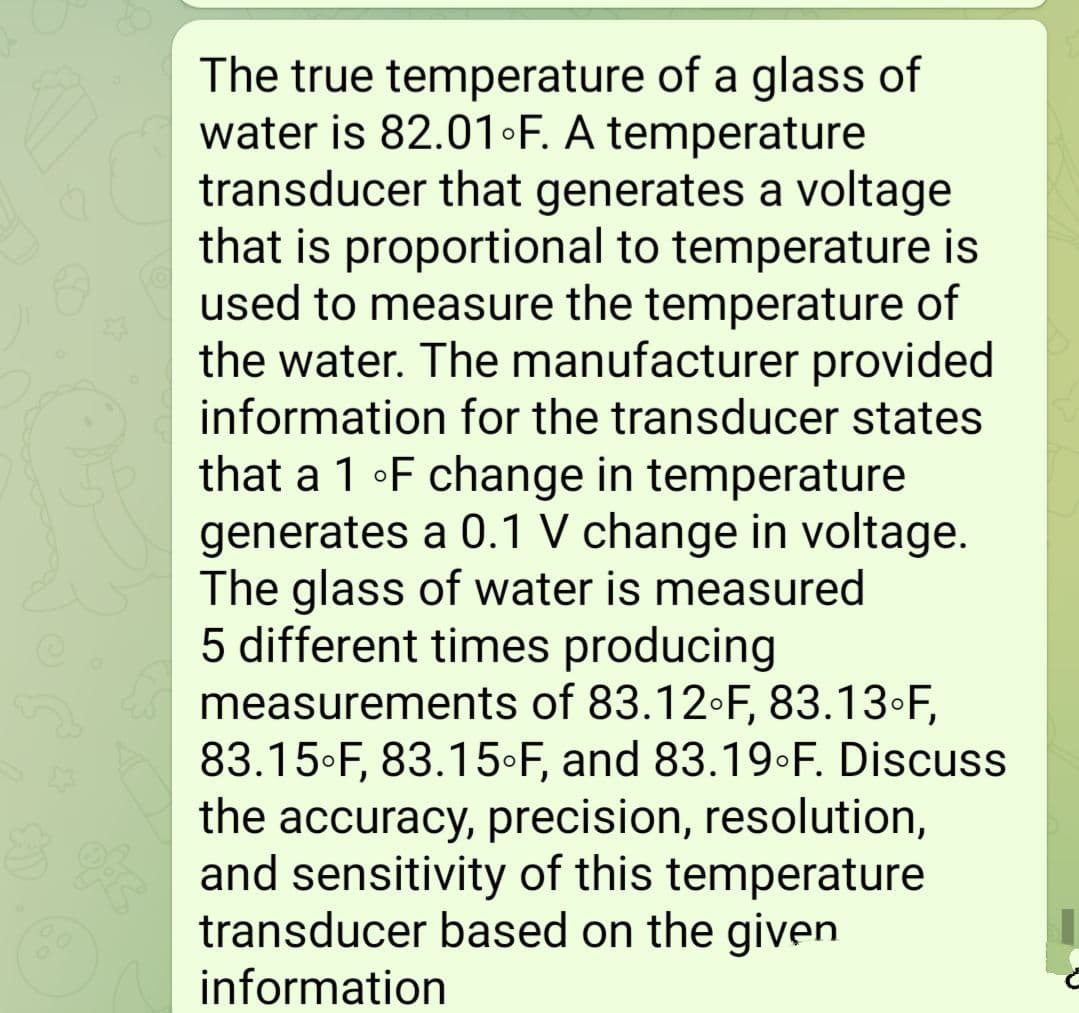The true temperature of a glass of water is 82.01•F. A temperature transducer that generates a voltage that is proportional to temperature is used to measure the temperature of the water. The manufacturer provided information for the transducer states that a 1 •F change in temperature generates a 0.1 V change in voltage. The glass of water is measured 5 different times producing measurements of 83.12•F, 83.13•F, 83.15•F, 83.15•F, and 83.19•F. Discuss the accuracy, precision, resolution, and sensitivity of this temperature transducer based on the given information
The true temperature of a glass of water is 82.01•F. A temperature transducer that generates a voltage that is proportional to temperature is used to measure the temperature of the water. The manufacturer provided information for the transducer states that a 1 •F change in temperature generates a 0.1 V change in voltage. The glass of water is measured 5 different times producing measurements of 83.12•F, 83.13•F, 83.15•F, 83.15•F, and 83.19•F. Discuss the accuracy, precision, resolution, and sensitivity of this temperature transducer based on the given information
Principles of Modern Chemistry
8th Edition
ISBN:9781305079113
Author:David W. Oxtoby, H. Pat Gillis, Laurie J. Butler
Publisher:David W. Oxtoby, H. Pat Gillis, Laurie J. Butler
Chapter17: Electrochemistry
Section: Chapter Questions
Problem 82AP
Related questions
Question

Transcribed Image Text:The true temperature of a glass of
water is 82.01 F. A temperature
transducer that generates a voltage
that is proportional to temperature is
used to measure the temperature of
the water. The manufacturer provided
information for the transducer states
that a 1 •F change in temperature
generates a 0.1 V change in voltage.
The glass of water is measured
5 different times producing
measurements of 83.12•F, 83.13•F,
83.15•F, 83.15•F, and 83.19•F. Discuss
the accuracy, precision, resolution,
and sensitivity of this temperature
transducer based on the given
information
Expert Solution
This question has been solved!
Explore an expertly crafted, step-by-step solution for a thorough understanding of key concepts.
This is a popular solution!
Trending now
This is a popular solution!
Step by step
Solved in 2 steps

Knowledge Booster
Learn more about
Need a deep-dive on the concept behind this application? Look no further. Learn more about this topic, chemistry and related others by exploring similar questions and additional content below.Recommended textbooks for you

Principles of Modern Chemistry
Chemistry
ISBN:
9781305079113
Author:
David W. Oxtoby, H. Pat Gillis, Laurie J. Butler
Publisher:
Cengage Learning

Chemistry for Engineering Students
Chemistry
ISBN:
9781337398909
Author:
Lawrence S. Brown, Tom Holme
Publisher:
Cengage Learning

General Chemistry - Standalone book (MindTap Cour…
Chemistry
ISBN:
9781305580343
Author:
Steven D. Gammon, Ebbing, Darrell Ebbing, Steven D., Darrell; Gammon, Darrell Ebbing; Steven D. Gammon, Darrell D.; Gammon, Ebbing; Steven D. Gammon; Darrell
Publisher:
Cengage Learning

Principles of Modern Chemistry
Chemistry
ISBN:
9781305079113
Author:
David W. Oxtoby, H. Pat Gillis, Laurie J. Butler
Publisher:
Cengage Learning

Chemistry for Engineering Students
Chemistry
ISBN:
9781337398909
Author:
Lawrence S. Brown, Tom Holme
Publisher:
Cengage Learning

General Chemistry - Standalone book (MindTap Cour…
Chemistry
ISBN:
9781305580343
Author:
Steven D. Gammon, Ebbing, Darrell Ebbing, Steven D., Darrell; Gammon, Darrell Ebbing; Steven D. Gammon, Darrell D.; Gammon, Ebbing; Steven D. Gammon; Darrell
Publisher:
Cengage Learning

Chemistry & Chemical Reactivity
Chemistry
ISBN:
9781133949640
Author:
John C. Kotz, Paul M. Treichel, John Townsend, David Treichel
Publisher:
Cengage Learning

Chemistry: Principles and Practice
Chemistry
ISBN:
9780534420123
Author:
Daniel L. Reger, Scott R. Goode, David W. Ball, Edward Mercer
Publisher:
Cengage Learning

Chemistry: Principles and Reactions
Chemistry
ISBN:
9781305079373
Author:
William L. Masterton, Cecile N. Hurley
Publisher:
Cengage Learning